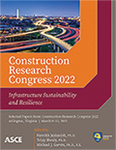Governing Contractor Greenwashing Behaviors in Construction Projects: The Heterogeneous and Interactive Roles of Contractual Governance and Trust
Publication: Construction Research Congress 2022
ABSTRACT
In recent years, the environmental issues that arise at the construction stage of projects have raised great concern. Despite good efforts, one of the major challenges for environmental sustainability of construction projects is how to govern the contractor greenwashing behaviors (GWBs), which are termed as the combinations of poor environmental performance along with positive environmental communications. Contractor GWBs pose a greater challenge for environmental governance in construction projects and are urgent to govern. Although previous research has underlined the mitigation mechanisms of GWBs from the external institutional perspective, the internal governance mechanisms toward project settings are ignored. Therefore, this paper aims to explore the heterogeneous and interactive roles of two common project governance mechanisms: formal contracts and trust in the context of temporary organizations (i.e., construction projects). This study contributes to gaining an understanding of GWBs and environmental sustainability in project settings, providing practical guidance for project practitioners.
Get full access to this article
View all available purchase options and get full access to this chapter.
REFERENCES
Aiken, L. S., West, S. G., and Reno, R. R. (1991). Multiple Regression: Testing and Interpreting Interactions. SAGE.
Cao, D., Li, H., and Wang, G. (2014). Impacts of isomorphic pressures on BIM adoption in construction projects. Journal of Construction Engineering and Management, 140(12), 1–9. https://doi.org/10.1061/(ASCE)CO.1943-7862.0000903.
Cerić, A., Vukomanović, M., Ivić, I., and Kolarić, S. (2020). Trust in megaprojects: A comprehensive literature review of research trends. International Journal of Project Management. https://doi.org/10.1016/j.ijproman.2020.10.007.
Chatterjee, S., and Hadi, A. S. (2015). Regression Analysis by Example. John Wiley & Sons.
Chen, H., Bernard, S., and Rahman, I. (2019). Greenwashing in hotels: A structural model of trust and behavioral. Journal of Cleaner Production, 206, 326–335. https://doi.org/10.1016/j.jclepro.2018.09.168.
Du, X. (2015). How the Market Values Greenwashing? Evidence from China. Journal of Business Ethics, 128(3), 547–574. https://doi.org/10.1007/s10551-014-2122-y.
He, Q., Wang, Z., Wang, G., Zuo, J., Wu, G., and Liu, B. (2020). To be green or not to be: How environmental regulations shape contractor greenwashing behaviors in construction projects. Sustainable Cities and Society, 63, 102462. https://doi.org/10.1016/j.scs.2020.102462.
Jiang, X., Li, M., Gao, S., Bao, Y., and Jiang, F. (2013). Managing knowledge leakage in strategic alliances: The effects of trust and formal contracts. Industrial Marketing Management, 42(6), 983–991. https://doi.org/10.1016/j.indmarman.2013.03.013.
Kurpierz, J. R., and Smith, K. (2020). The greenwashing triangle: Adapting tools from fraud to improve CSR reporting. Sustainability Accounting, Management and Policy Journal, ahead-of-print(ahead-of-print). https://doi.org/10.1108/SAMPJ-10-2018-0272.
Luo, Y. (2002). Contract, cooperation, and performance in international joint ventures. Strategic Management Journal, 23(10), 903–919. https://doi.org/10.1002/smj.261.
Luo, Y., Liang, F., and Ma, Z. (2013). The effects of contractual governance and relational governance on construction project performance: An empirical study. International Journal of Digital Content Technology and Its Applications, 7(8), 741.
Lyon, T. P., and Montgomery, A. W. (2015). The means and end of greenwash. Organization and Environment, 28(2), 223–249. https://doi.org/10.1177/1086026615575332.
Mahoney, L. S., Thorne, L., Cecil, L., and LaGore, W. (2013). A research note on standalone corporate social responsibility reports: Signaling or greenwashing? Critical Perspectives on Accounting, 24(4–5), 350–359. https://doi.org/10.1016/j.cpa.2012.09.008.
Ng, K.-Y., and Chua, R. Y. J. (2006). Do I Contribute More When I Trust More? Differential Effects of Cognition- and Affect-Based Trust. Management and Organization Review, 2(1), 43–66. https://doi.org/10.1111/j.1740-8784.2006.00028.x.
Pizzetti, M., Gatti, L., and Seele, P. (2019). Firms Talk, Suppliers Walk: Analyzing the Locus of Greenwashing in the Blame Game and Introducing ‘ Vicarious Greenwashing ’. Journal of Business Ethics. https://doi.org/10.1007/s10551-019-04406-2.
Roehrich, J. K., Selviaridis, K., Kalra, J., Van der Valk, W., and Fang, F. (2020). Inter-organizational governance: A review, conceptualisation and extension. Production Planning & Control, 31(6), 453–469. https://doi.org/10.1080/09537287.2019.1647364.
Ruijter, H., van Marrewijk, A., Veenswijk, M., and Merkus, S. (2021). ‘Filling the mattress’: Trust development in the governance of infrastructure megaprojects. International Journal of Project Management, 39(4), 351–364. https://doi.org/10.1016/j.ijproman.2020.09.003.
Steinmeier, M. (2016). Fraud in Sustainability Departments? An Exploratory Study. Journal of Business Ethics, 138(3), 477–492. https://doi.org/10.1007/s10551-015-2615-3.
Sydow, J., and Braun, T. (2018). Projects as temporary organizations: An agenda for further theorizing the interorganizational dimension. International Journal of Project Management, 36(1), 4–11. https://doi.org/10.1016/j.ijproman.2017.04.012.
Testa, F., Boiral, O., and Iraldo, F. (2018). Internalization of environmental practices and institutional complexity: Can stakeholders pressures encourage greenwashing? Journal of Business Ethics, 147(2), 287–307. https://doi.org/10.1007/s10551-015-2960-2.
Wang, G., He, Q., Xia, B., Meng, X., and Wu, P. (2018). Impact of Institutional Pressures on Organizational Citizenship Behaviors for the Environment: Evidence from Megaprojects. Journal of Management in Engineering, 34(5), 04018028. https://doi.org/10.1061/(ASCE)ME.1943-5479.0000628.
Wang, L., Yeung, J. H. Y., and Zhang, M. (2011). The impact of trust and contract on innovation performance: The moderating role of environmental uncertainty. International Journal of Production Economics, 134(1), 114–122. https://doi.org/10.1016/j.ijpe.2011.06.006.
Yan, L., and Zhang, L. (2020). Interplay of Contractual Governance and Trust in Improving Construction Project Performance: Dynamic Perspective. Journal of Management in Engineering, 36(4), 04020029. https://doi.org/10.1061/(ASCE)ME.1943-5479.0000791.
Yang, J. (2017). Environmental Management in Mega Construction Projects. Springer Singapore. https://doi.org/10.1007/978-981-10-3605-7.
Information & Authors
Information
Published In
History
Published online: Mar 7, 2022
Authors
Metrics & Citations
Metrics
Citations
Download citation
If you have the appropriate software installed, you can download article citation data to the citation manager of your choice. Simply select your manager software from the list below and click Download.
